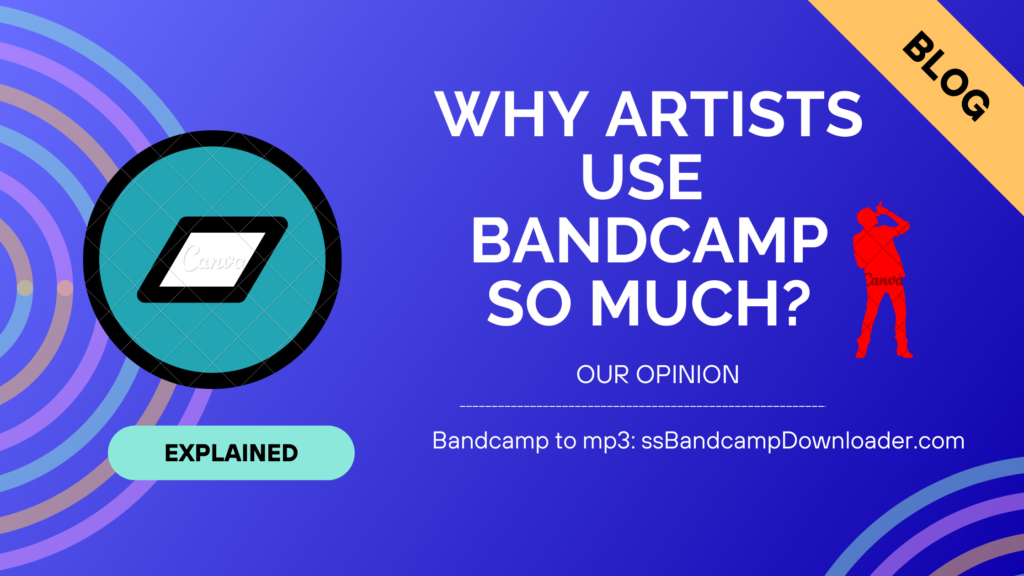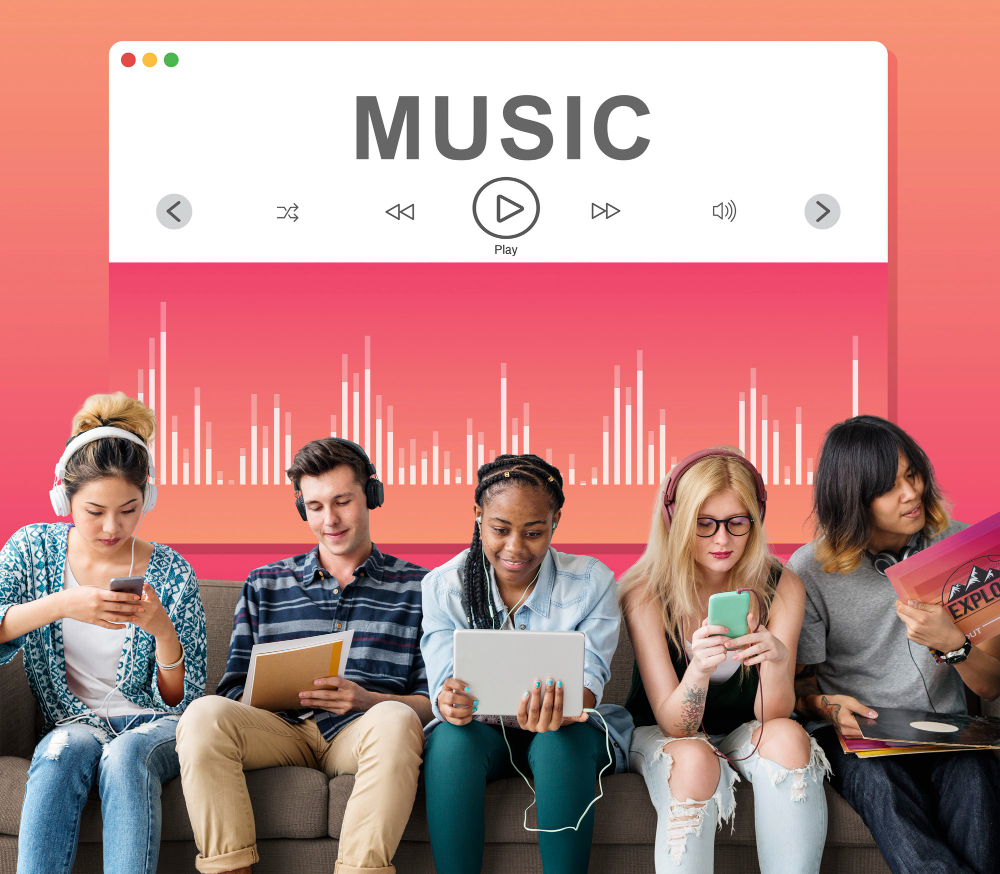In the ever-evolving landscape of the music industry, artists constantly seek platforms that empower their creative endeavors while allowing them to maintain a direct connection with their fanbase. Bandcamp, a unique online music marketplace, has emerged as a beacon for independent musicians and bands.
This article delves into the intriguing world of Bandcamp and explores the compelling reasons why artists choose to make this platform their creative home. From its distinctive features that grant artists unparalleled control over their work to the financial considerations that make it a viable choice, we embark on a journey to understand why Bandcamp remains a compelling choice for musicians in the digital age.

The Appeal of Bandcamp for Artists
When examining the allure of Bandcamp for artists, it becomes evident that this platform offers a range of benefits that cater to musicians looking to navigate the complex music industry terrain. Here, we delve into the core reasons why artists are drawn to Bandcamp.
Direct-to-Fan Sales
One of the primary attractions of Bandcamp lies in its support for direct-to-fan sales. Unlike many other music distribution platforms, Bandcamp empowers artists to sell their music and merchandise directly to their fanbase.
This direct relationship eliminates the need for intermediaries and provides artists with a more substantial share of their earnings.
Musicians can set their own pricing, allowing for flexibility to experiment with various pricing strategies, such as pay-what-you-want or tiered pricing. This financial autonomy is a game-changer for independent artists, enabling them to sustain their creative careers.
Creative Control
Artists cherish creative control over their work, and Bandcamp recognizes this fundamental need. The platform allows musicians to create and customize their artist pages, infusing them with their unique branding and aesthetics.
Moreover, artists can personalize album artwork and merchandise options, ensuring that their music is presented to the world exactly as intended. This level of creative freedom empowers artists to shape their online presence authentically and align it with their artistic vision.
Community Engagement

Beyond a marketplace, Bandcamp serves as a hub for fostering artist-fan interactions. Musicians have the opportunity to build and nurture their fanbase by actively engaging with their listeners.
Fans can leave comments and reviews on albums and tracks, providing artists with valuable feedback and creating a sense of community.
Additionally, the platform allows artists to communicate directly with their followers through messaging features. This personalized engagement is instrumental in building strong and loyal fan relationships, which can be a driving force for an artist’s career.
The appeal of Bandcamp for artists is rooted in its support for direct-to-fan sales, offering financial autonomy; its commitment to creative control, allowing artists to shape their online identity; and its dedication to community engagement, facilitating meaningful connections between artists and their fans. These elements make Bandcamp an attractive platform for musicians seeking to navigate the music industry on their own terms.
Financial Considerations
When artists explore their options in the digital music marketplace, financial considerations are paramount. Bandcamp stands out as a platform that offers unique financial advantages and sustainability opportunities for independent musicians.
Revenue Generation
A key factor that draws artists to Bandcamp is its revenue generation model. Unlike some other music distribution platforms, Bandcamp allows artists to retain a more substantial share of their earnings.
It operates on a revenue-sharing model, where the majority of sales revenue goes directly to the artist. This direct-to-artist payment structure contrasts with traditional record label contracts, where artists often receive a smaller share of their music’s revenue.
In addition, Bandcamp’s fee structure is transparent. While the platform does charge a commission on sales (which varies based on the type of content and amount of sales), it is clearly outlined, allowing artists to calculate their potential earnings accurately.
Sustainability for Independent Artists

For independent musicians, sustainability is a critical consideration. Bandcamp offers a pathway to sustainable music careers by providing artists with the tools and resources they need to generate income and support their work.
With the ability to set their own pricing, artists can experiment with different strategies to find what works best for them. Whether it’s offering free downloads, pay-what-you-want options, or tiered pricing, Bandcamp enables artists to adapt their sales approach to their unique fanbase and goals.
The platform also encourages fan engagement through features like fan messaging and exclusive content. This engagement not only helps artists build and maintain a loyal following but also opens up opportunities for crowdfunding and fan support.
Many artists use Bandcamp to fund their projects, including album releases, tours, and merchandise production, thanks to the platform’s supportive community of fans.
Bandcamp’s financial considerations make it an appealing choice for artists seeking greater control over their revenue and sustainable careers. Its revenue-sharing model and pricing flexibility empower musicians to take charge of their finances, allowing them to focus on creating the music they love and fostering meaningful connections with their fanbase.
Marketing and Promotion on Bandcamp
In the crowded digital music landscape, effective marketing and promotion are essential for artists to stand out and connect with their audience. Bandcamp provides a range of tools and features that empower musicians to promote their work and engage with fans in meaningful ways.
Utilizing Tags and Metadata
Bandcamp offers a robust set of features to enhance discoverability. Artists can tag their music with relevant keywords, genres, and subgenres, making it easier for fans to find their music through search and browsing.
This tagging system is particularly valuable for niche or independent musicians who may not have the same exposure as mainstream artists. By accurately describing their music, artists can attract listeners who appreciate their unique style.
Additionally, Bandcamp allows artists to provide detailed metadata for their releases, including album credits, lyrics, and liner notes. This additional context can deepen fans’ connection to the music and provide a richer experience.
Exclusive Content and Pre-orders
Creating anticipation and excitement around a music release is a vital part of marketing, and Bandcamp offers tools to achieve this.
Artists can offer exclusive content to their Bandcamp followers, such as unreleased tracks, behind-the-scenes content, or early access to new releases. This encourages fans to follow their favorite artists on the platform, building a more engaged and loyal fanbase.
Pre-orders are another valuable promotional tool on Bandcamp. Musicians can set up pre-order campaigns for upcoming releases, allowing fans to purchase and support the album before its official launch.
This not only generates early revenue but also builds excitement and ensures that fans are notified as soon as the music is available.
Bandcamp provides musicians with effective marketing and promotion tools, including tagging and metadata for improved discoverability, the option to offer exclusive content to followers, and the ability to create pre-order campaigns. These features empower artists to connect with their audience and build anticipation around their music, contributing to their success on the platform.
Building a Community

Building a strong and engaged community is crucial for artists seeking long-term success in the music industry. Bandcamp recognizes the importance of artist-fan interactions and provides features that facilitate community building.
Fan Interaction
Bandcamp encourages artists and fans to connect through meaningful interactions. Fans can leave comments and reviews on albums and individual tracks, creating a space for dialogue and feedback.
This direct communication allows artists to understand their audience better, gather constructive criticism, and build a loyal following.
Responding to comments is a simple yet effective way for artists to engage with fans and show appreciation for their support. By actively participating in these conversations, musicians can foster a sense of connection and loyalty among their audience.
Email List and Fan Messaging
Collecting and maintaining an email list is a powerful tool for staying in touch with fans. Bandcamp provides artists with the ability to collect email addresses from fans who purchase their music.
This email list can then be used to send updates, newsletters, and announcements directly to the artist’s most dedicated supporters.
Fan messaging is another feature that allows artists to send private messages to their followers on Bandcamp. This direct form of communication is perfect for sharing exclusive content, tour announcements, and personal updates. It creates a more personal connection between artists and fans, making supporters feel valued and engaged.
In essence, Bandcamp’s focus on community building empowers artists to create meaningful connections with their audience.
Features like fan interaction through comments, email list collection, and fan messaging enable musicians to engage with fans, share updates, and build a dedicated community around their music. This sense of community can be instrumental in sustaining an artist’s career and fostering long-term support.
Case Studies
To provide a real-world perspective on the impact of Bandcamp for artists, let’s examine a few case studies of musicians who have found success and unique strategies on the platform.
Amanda Palmer: Crowdfunding and Fan Engagement
Amanda Palmer, a well-known indie artist and former member of The Dresden Dolls, used Bandcamp to launch a groundbreaking crowdfunding campaign for her album “Theatre Is Evil.” She raised over a million dollars from her fans, demonstrating Bandcamp’s potential for funding creative projects.
Her success also highlighted the power of direct artist-fan engagement, as she regularly communicates with her fans on the platform and offers exclusive content to her Bandcamp followers.
Car Seat Headrest: Gaining Exposure through Tags and Metadata
Car Seat Headrest, an indie rock band, harnessed the tagging and metadata features of Bandcamp to gain exposure. By accurately tagging their music with relevant genres and keywords, they attracted a niche audience looking for their distinctive sound.
This strategy helped them build a dedicated following before signing with a major label, showcasing how Bandcamp can serve as a springboard for emerging artists.
Tash Sultana: Leveraging Fan Messaging for Promotion
Tash Sultana, a multi-instrumentalist and singer-songwriter, utilized Bandcamp’s fan messaging feature to connect with followers directly.
By sending personalized messages to fans about upcoming releases, tours, and merchandise, Sultana created a sense of exclusivity and excitement around her music. This direct communication played a pivotal role in building a devoted fanbase.
These case studies illustrate the diverse ways in which artists can leverage Bandcamp to achieve success. Whether it’s through crowdfunding, effective use of tags and metadata, or direct fan messaging, Bandcamp offers a versatile platform that can accommodate various strategies for musicians looking to thrive in the digital music landscape.
Challenges and Limitations
While Bandcamp offers numerous advantages for artists, it’s essential to acknowledge the platform’s challenges and limitations that artists may encounter:
Competition with Other Platforms
One significant challenge for artists on Bandcamp is the competition with other music distribution platforms such as Spotify, Apple Music, and Amazon Music.
While Bandcamp provides unique benefits, these major streaming services have a more extensive user base and may offer higher visibility. Artists must carefully consider how to balance their presence on Bandcamp with other platforms to reach a broader audience.
Discoverability Challenges
Despite its tagging and metadata features, Bandcamp can still pose discoverability challenges, especially for lesser-known artists.
The platform’s effectiveness depends on fans actively searching for specific genres or keywords. Artists in less mainstream or niche genres may struggle to reach a wider audience due to limited visibility in search results.
The Need for Effective Self-Promotion
While Bandcamp provides tools for marketing and fan engagement, artists must actively promote their music and engage with fans to maximize their success on the platform.
This requires time and effort, and some artists may find self-promotion challenging or overwhelming. Without consistent promotion, artists may struggle to build a substantial following on Bandcamp.
Limited Revenue from Free Downloads
While Bandcamp allows artists to offer their music for free or on a pay-what-you-want basis, generating revenue from free downloads can be challenging. Many fans opt to download Bandcamp music for free, which can impact an artist’s income.
Striking the right balance between offering free content to attract new fans and generating revenue can be a delicate task.
Genre and Audience Dependence
Bandcamp’s effectiveness can vary significantly depending on the artist’s genre and target audience.
Some genres may have a more dedicated Bandcamp user base, while others might see better results on mainstream streaming platforms. Artists must understand their audience and consider whether Bandcamp aligns with their genre and fanbase.
In conclusion, while Bandcamp offers numerous benefits, including direct-to-fan sales, creative control, and community engagement, artists should be aware of the challenges and limitations they may encounter.
Balancing Bandcamp with other platforms, addressing discoverability issues, and actively engaging in self-promotion are essential steps for artists to thrive on the platform.
Conclusion
In conclusion, Bandcamp remains a compelling choice for artists seeking autonomy and direct engagement with their fanbase. Its unique blend of direct-to-fan sales, creative control, and community building tools empowers musicians in the digital age.
While challenges like competition and discoverability persist, Bandcamp’s benefits, as showcased in case studies, highlight its potential for fostering artistic success.
As artists navigate the ever-changing music industry, Bandcamp stands as a platform that champions creative freedom, financial sustainability, and meaningful connections. Its role in shaping the future of independent music is undeniable, offering artists an authentic space to thrive on their own terms.
FAQs
Yes, you can! Bandcamp offers the option to sell physical merchandise like vinyl records, CDs, t-shirts, and more alongside your music. This allows you to create a comprehensive online store for your fans.
No, Bandcamp is open to artists of all levels of fame. While it’s a popular platform for independent musicians, even established artists have used Bandcamp to release exclusive content and engage with their fanbase in unique ways.
Bandcamp has a transparent revenue-sharing model. Artists receive a significant share of their sales revenue, typically 85-90%, depending on sales volume. The remaining percentage covers transaction fees and platform maintenance.
Yes, you can use Bandcamp as a sales and distribution platform, but it doesn’t directly distribute your music to other streaming services. Artists often use separate distribution services like DistroKid or TuneCore to get their music on platforms like Spotify and Apple Music.
Creating an artist account on Bandcamp is free. However, Bandcamp takes a percentage of sales as a commission, typically around 10-15% depending on the type of content. This fee structure allows artists to use the platform without any upfront costs.
